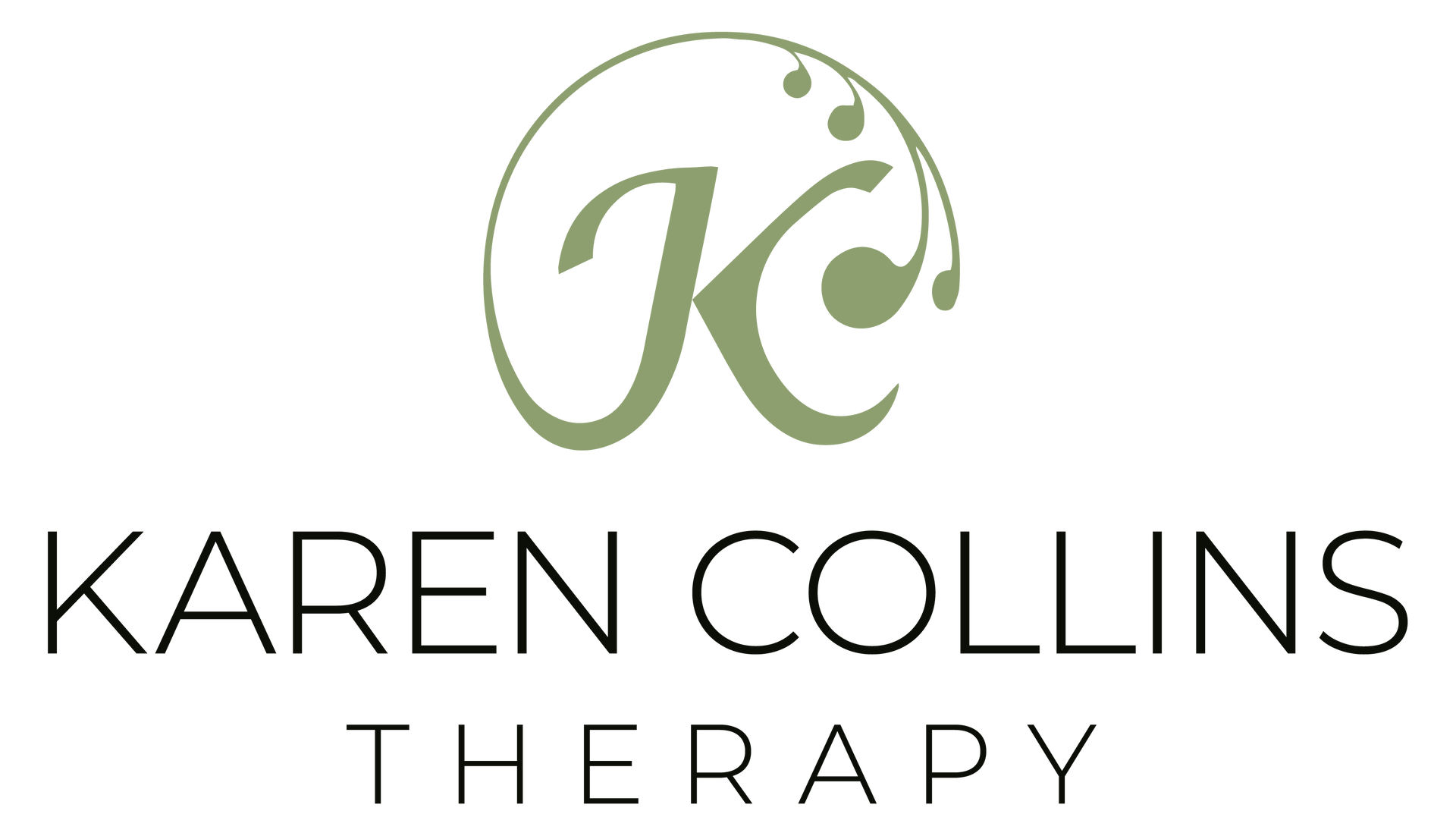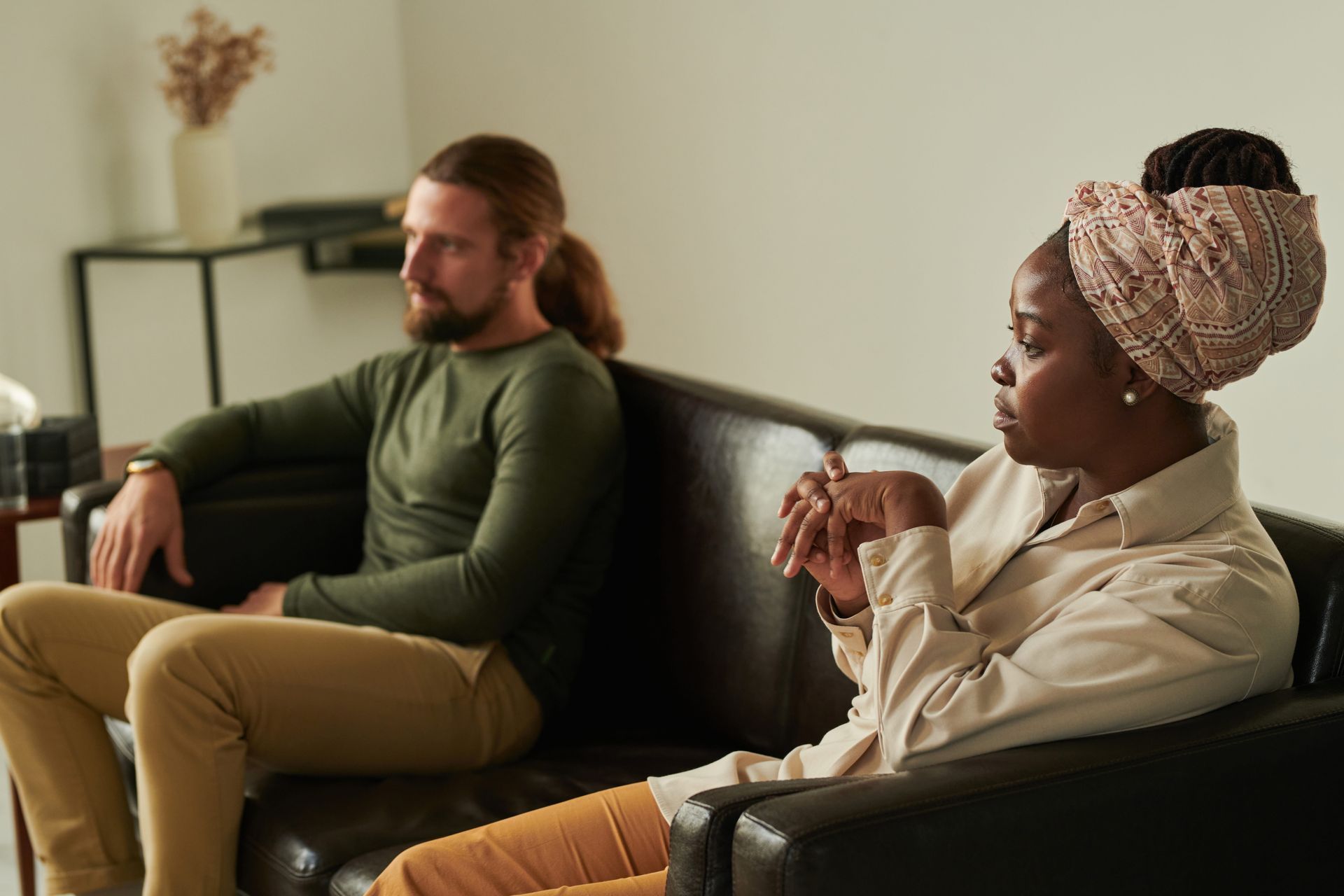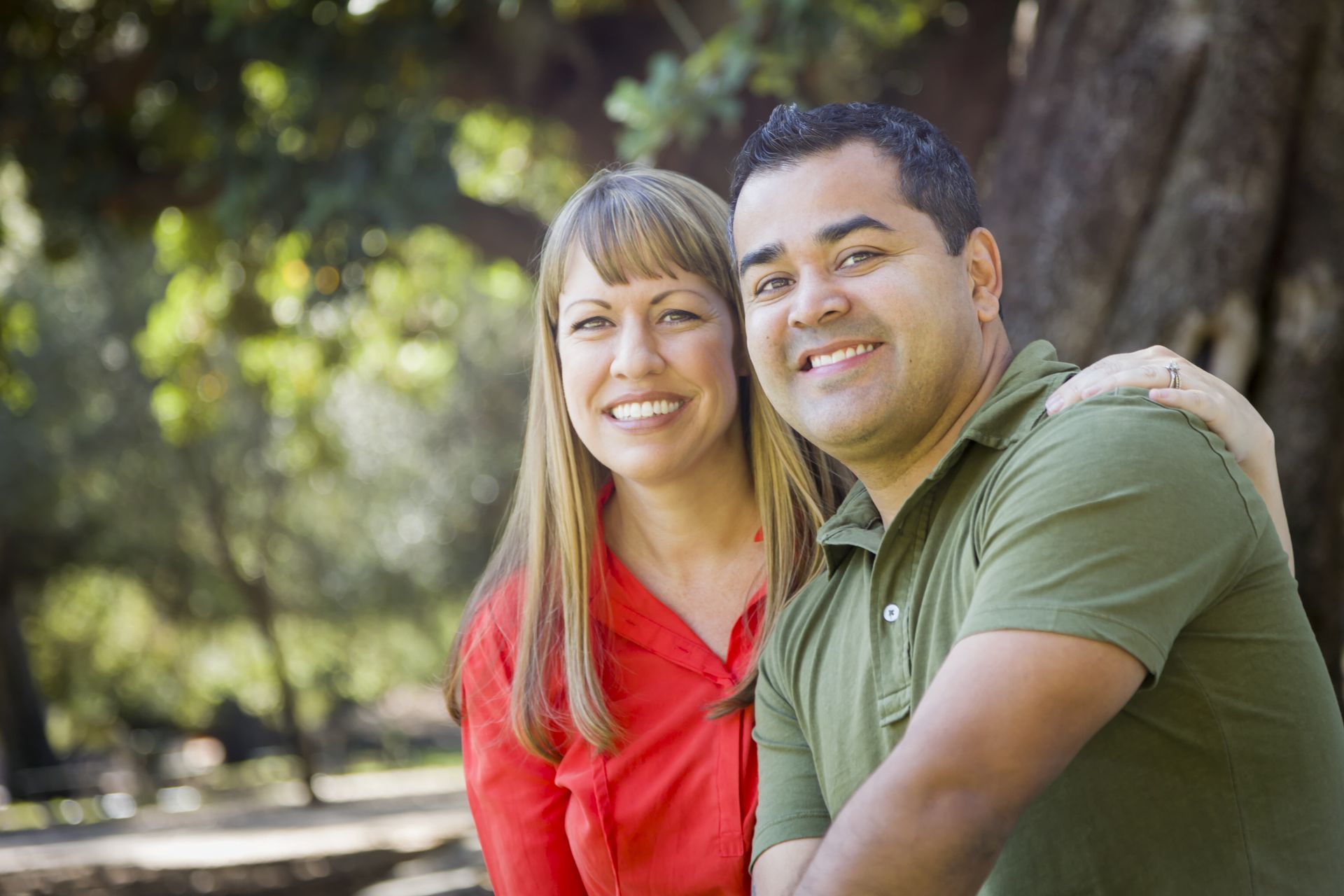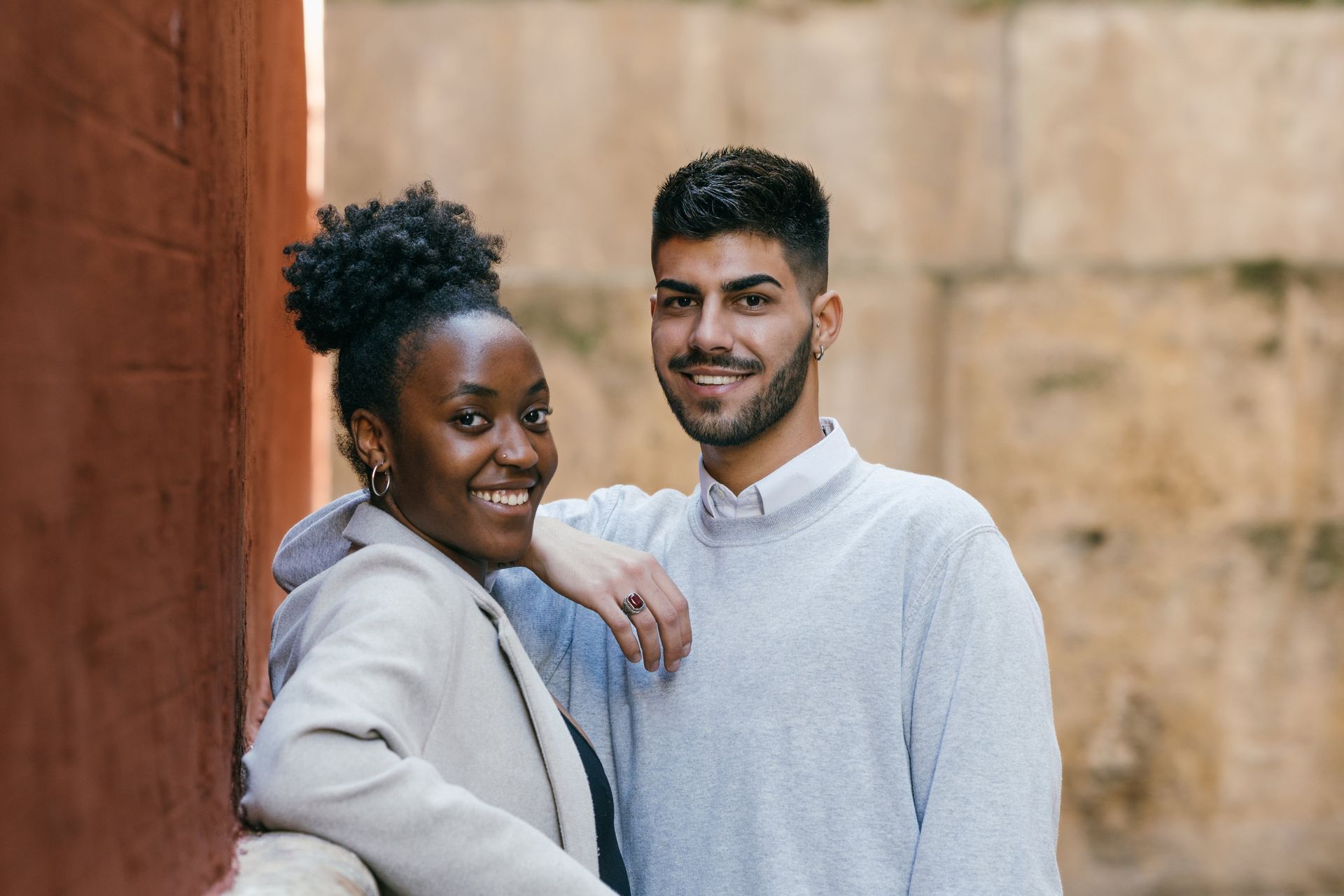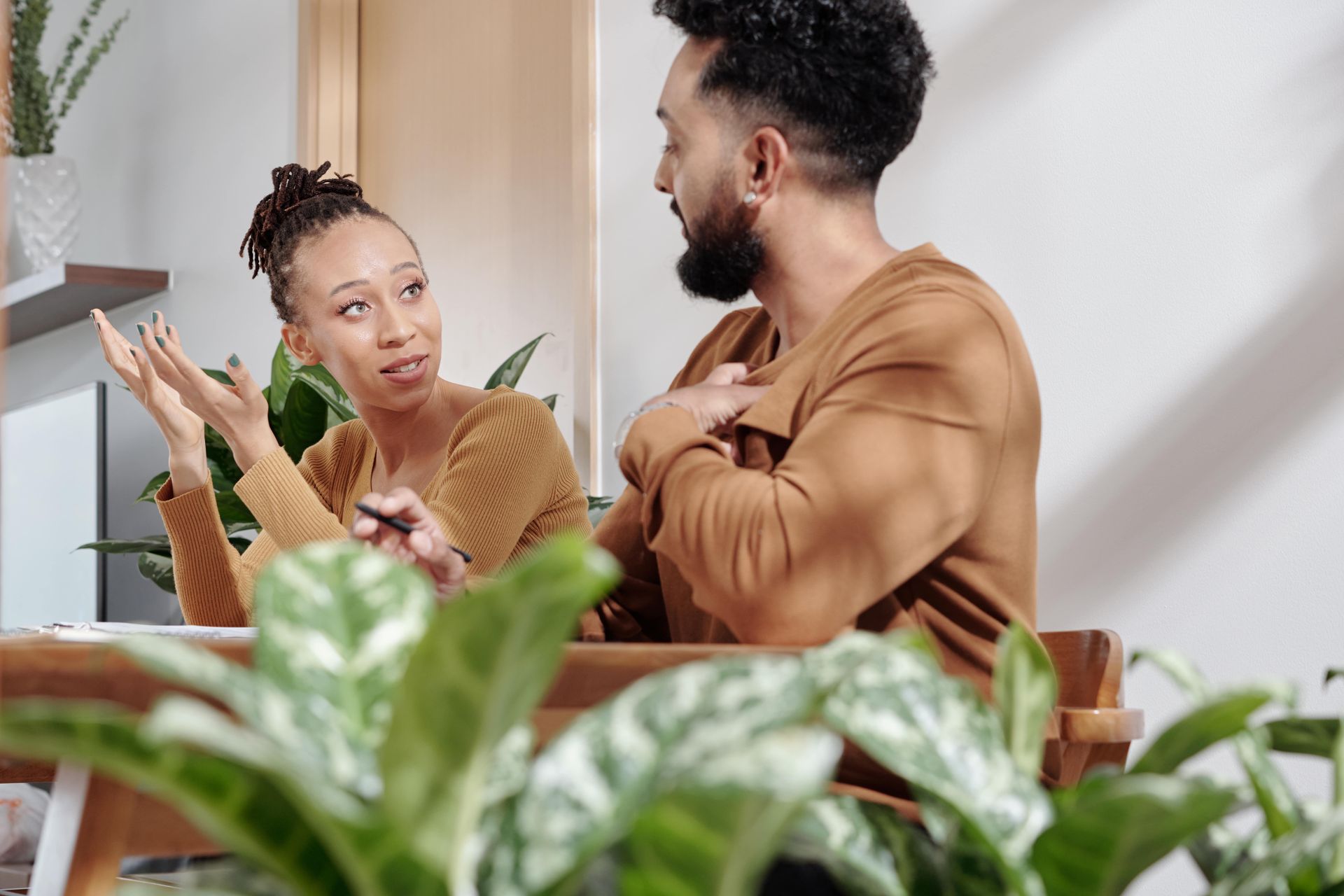Couples Communication Therapy in Petaluma: Transform Your Relationship Through Better Connection | Karen Collins LMFT
When couples come to my practice in Petaluma, over 85% tell me they need help with communication. They're frustrated, feeling unheard, and often find themselves having the same arguments over and over again. If this sounds familiar, you're not alone.
Communication challenges are one of the most common reasons couples seek therapy, and the good news is that these skills can absolutely be learned and improved.
As a licensed marriage and family therapist with over 18 years of experience providing couples therapy in Petaluma, I've witnessed countless relationships transform when partners learn to truly hear and understand each other. Whether you're newlyweds struggling to navigate your first major disagreements or you've been together for decades and feel like you're speaking different languages, couples communication therapy can help you rebuild the connection you once had.
Understanding Communication Challenges in Relationships
Communication problems in relationships rarely start overnight. They develop gradually, often beginning as small misunderstandings that compound over time. Life transitions, stress, parenting challenges, work pressures, and unaddressed conflicts all contribute to communication breakdowns that leave couples feeling disconnected and frustrated.
In my counseling practice in Petaluma, I see couples who describe feeling like roommates rather than romantic partners. They tell me they avoid certain topics to prevent arguments, or they find themselves caught in cycles where every conversation becomes a conflict. These patterns are incredibly common, and they're also completely changeable with the right support and tools.
The first step in couples communication therapy is understanding that most communication issues aren't really about the surface topics couples argue about. When a couple argues about dishes, finances, or parenting decisions, there are usually deeper needs underneath, needs for connection, understanding, appreciation, or emotional safety. Effective therapy helps identify these underlying needs and teaches couples how to express them in ways that bring them closer together rather than driving them apart.
How Couples Therapy Addresses Communication Problems
Couples therapy focused on communication takes a comprehensive approach to helping partners reconnect. Rather than just teaching techniques, effective therapy helps couples understand the patterns that keep them stuck and provides practical tools they can use in their daily lives.
In my practice, I draw from evidence-based approaches including attachment-informed therapy and solution-focused techniques. This means we focus on building on your existing strengths as a couple while addressing the specific areas where communication breaks down. Every couple has moments when they communicate well, my job is to help you understand what makes those moments work and how to create more of them.
During couples therapy sessions, we work on several key areas. First, we identify your unique communication patterns and triggers. Many couples are surprised to discover that their arguments follow predictable cycles. Understanding these patterns is the first step toward interrupting them and choosing different responses.
Second, we practice new communication skills in the safety of the therapy room. This might include learning to express needs without criticism, listening to understand rather than to defend, and managing emotional reactions during difficult conversations. The therapy setting provides a neutral space where you can try new approaches with professional guidance.
The Role of Emotional Safety in Communication
One of the most important aspects of couples communication therapy is creating emotional safety in the relationship. When partners don't feel safe expressing their thoughts and feelings, communication shuts down. This safety isn't just about avoiding conflict, it's about creating an environment where both partners can be vulnerable, honest, and authentic without fear of judgment or retaliation.
Building emotional safety takes time and intentional effort from both partners. In therapy, we explore what makes each person feel safe and heard in the relationship. This often involves addressing past hurts that may be influencing current interactions, and learning to repair damage when communication breaks down.
For many couples, the journey toward better communication involves learning to slow down during conflicts. When we feel threatened or misunderstood, our natural tendency is to react quickly, to defend, explain, or counterattack. Effective communication therapy teaches couples how to pause, breathe, and respond thoughtfully rather than react impulsively.
Common Communication Patterns That Hurt Relationships
In my years as a therapist in Petaluma, I've observed certain communication patterns that consistently create problems for couples. Recognizing these patterns in your own relationship is often the first step toward change.
Criticism and defensiveness form one of the most destructive cycles in relationships. When one partner expresses frustration through criticism ("You always..." or "You never..."), the other partner naturally becomes defensive. This defensiveness then escalates the criticism, creating a cycle that leaves both people feeling attacked and misunderstood.
Stonewalling is another common pattern where one partner withdraws from difficult conversations. While this might feel protective in the moment, it often leaves the other partner feeling abandoned and unimportant. In couples therapy, we work on helping both partners stay engaged in difficult conversations while managing their emotional reactions.
Contempt, expressing disgust, superiority, or disdain toward your partner, is one of the most damaging communication patterns. It's also one of the strongest predictors of relationship breakdown. The good news is that contempt can be addressed in therapy by rebuilding appreciation and respect between partners.
The Solution-Focused Approach to Communication Therapy
In my practice, I integrate solution-focused techniques with attachment-informed approaches to help couples build on their existing strengths. Rather than spending endless time analyzing what's wrong, we focus on identifying what's working and how to do more of it.
This approach recognizes that every couple has times when they communicate effectively. Maybe it's during morning coffee before the day gets stressful, or perhaps you connect well when you're taking walks together. By understanding what conditions allow for good communication, we can work on creating more opportunities for positive connection.
Solution-focused couples communication therapy also emphasizes small, achievable changes rather than trying to overhaul your entire relationship at once. We might start with something as simple as agreeing to put phones away during dinner conversations or implementing a five-minute check-in ritual each evening.
Building Active Listening Skills
One of the foundational skills we work on in couples therapy is active listening, truly hearing and understanding your partner's perspective, even when you disagree. This goes far beyond simply waiting for your turn to talk. Active listening involves giving your full attention, reflecting back what you hear, and asking questions to better understand your partner's experience.
Many couples are surprised to discover how challenging active listening can be, especially during emotionally charged conversations. It requires setting aside your own need to be understood temporarily and focusing completely on understanding your partner. This skill takes practice, but it's transformative for relationships.
In therapy sessions, couples practice active listening with guidance and support. We start with less emotionally charged topics and gradually work up to more difficult conversations. Partners learn to summarize what they hear before responding, and to ask clarifying questions when they're unsure about their partner's meaning.
Expressing Needs Without Criticism
Learning to express your needs, wants, and concerns without criticism or blame is another crucial communication skill. Many people learned indirect communication styles in their families of origin and struggle to be direct about what they need from their partners.
In couples communication therapy, we work on using "I" statements that focus on your own experience rather than your partner's behavior. Instead of saying "You never help with the kids," you might learn to say "I feel overwhelmed managing the children's schedules alone and would appreciate help with bedtime routines."
This shift might seem small, but it creates space for your partner to respond with support rather than defensiveness. When people feel criticized, they naturally want to defend themselves or counterattack. When they hear about your experience and needs, they're more likely to want to help and connect.
Managing Emotional Reactions During Difficult Conversations
Even with the best communication skills, difficult conversations can trigger strong emotional reactions. Part of effective couples communication therapy involves learning to recognize when you're becoming emotionally flooded and knowing how to calm yourself so you can continue the conversation productively.
This might involve taking breaks when conversations become too heated, practicing breathing techniques to manage anxiety or anger, or learning to identify your emotional triggers before they escalate conflicts. Some couples benefit from establishing signals that indicate when one person needs a break to collect themselves.
The goal isn't to eliminate emotions from your communications, feelings are important information that can deepen intimacy when shared appropriately. Instead, we work on expressing emotions in ways that invite connection rather than creating distance.
The Gottman Method and Communication Research
While I'm not formally certified in the Gottman Method, I incorporate many research-based techniques from their extensive studies on what makes relationships work. The Gottman research has identified specific communication patterns that predict relationship success and those that predict divorce with remarkable accuracy.
Successful couples maintain a positive perspective about their partner and their relationship, even during conflicts. They express appreciation regularly, approach problems as a team, and repair quickly when conversations go off track. These are all skills that can be developed through couples therapy.
The research also shows that it's not whether couples have conflict that matters, all healthy relationships include disagreements. What matters is how couples handle conflict and whether they can return to connection and warmth after difficult conversations.
Addressing Life Transitions and Communication Stress
Major life transitions often put extra stress on communication in relationships. Whether you're adjusting to parenthood, dealing with job changes, caring for aging parents, or navigating other significant changes, these periods can strain even the strongest relationships.
During life transitions, couples therapy can provide tools for maintaining connection during stressful times. We work on adjusting communication patterns to accommodate new realities while preserving intimacy and partnership. This might involve creating new rituals for connection or finding ways to support each other through challenging periods.
Many couples find that their communication styles that worked well in earlier stages of their relationship need adjustment as life circumstances change. This is completely normal, and therapy can help you adapt your communication to meet your current needs.
Individual Therapy and Relationship Communication
Sometimes, communication problems in relationships are influenced by individual factors such as anxiety, depression, or past trauma. In these cases, I might recommend individual therapy alongside couples work to address personal challenges that impact relationship dynamics.
For example, if one partner struggles with anxiety that makes them interpret neutral comments as criticism, individual therapy can help them develop coping strategies that reduce this reactivity. When both partners are working on their individual growth alongside their relationship growth, the results are often more sustainable.
This doesn't mean that relationship problems are any one person's fault, communication challenges are always co-created by both partners. However, addressing individual factors that contribute to communication difficulties can accelerate progress in couples therapy.
Creating New Communication Patterns Together
The ultimate goal of couples communication therapy is to help you develop new, healthier patterns of interaction that feel natural and sustainable. This process takes time and practice, but the results can transform your relationship.
In therapy, we identify the specific changes that would make the biggest difference in your relationship. This might be learning to discuss parenting decisions without arguing, finding ways to talk about finances without stress, or simply creating more opportunities for positive daily interactions.
Change happens gradually, and there will likely be setbacks along the way. This is normal and expected. The key is learning to repair quickly when old patterns resurface and getting back on track toward your communication goals.
What to Expect in Couples Communication Therapy
If you're considering couples therapy in Petaluma for communication issues, you might wonder what the process actually looks like. In my practice, we start with an initial session where I get to know you both as individuals and as a couple. I'll ask about your relationship history, current challenges, and what you hope to achieve through therapy.
During the first session, we'll identify your specific communication patterns and begin setting goals for your work together. I tailor my approach to each couple's unique needs, drawing from various therapeutic techniques while maintaining a warm, non-judgmental environment where both partners feel heard and supported.
Sessions typically involve practicing new communication skills, processing difficult conversations that happened during the week, and working on specific challenges you're facing. I provide homework assignments and exercises you can practice between sessions to reinforce the skills you're learning.
The Benefits of Local Couples Therapy in Petaluma
Choosing a therapist in Petaluma means working with someone who understands our local community and the unique stressors that couples in our area face. Whether you're dealing with the challenges of Bay Area living costs, managing work-life balance in wine country, or navigating the particular dynamics of our close-knit community, local therapy provides relevant, culturally aware support.
In-person therapy also offers advantages for couples work. The ability to observe body language, practice communication skills in real-time, and create a consistent therapeutic environment can enhance the therapy experience. However, I also understand that online therapy may be more convenient for some couples, and I'm flexible in accommodating different needs.
Building Long-Term Communication Success
Effective couples communication therapy doesn't just solve immediate problems, it provides tools and skills you can use throughout your relationship to navigate future challenges. The communication skills you learn become part of your relationship toolkit, helping you handle whatever life brings your way.
Many couples find that therapy helps them not only communicate better but also feel more connected, appreciated, and understood. When partners learn to truly hear each other, intimacy often increases, conflicts decrease, and the overall satisfaction in the relationship improves significantly.
Frequently Asked Questions About Couples Communication Therapy
How long does couples communication therapy take? The length of therapy varies depending on each couple's specific needs and goals. Some couples see significant improvement within a few months, while others benefit from longer-term work. We'll discuss your progress regularly and adjust our approach as needed.
What if my partner doesn't want to come to therapy? While couples therapy works best when both partners are committed to the process, I understand that one person often initiates therapy while the other is hesitant. We can discuss strategies for encouraging your partner's participation and explore individual work that might improve your relationship dynamics.
Can therapy help if we've been having the same arguments for years? Absolutely. Long-standing communication patterns can be changed with the right tools and support. Often, couples are surprised to discover that their repetitive arguments are actually about deeper needs that haven't been addressed.
Do you provide homework or exercises to practice at home? Yes, practicing new communication skills between sessions is crucial for lasting change. I provide specific exercises and assignments tailored to each couple's needs and goals.
How do I know if we need couples therapy for communication issues? If you find yourselves having the same arguments repeatedly, avoiding certain topics to prevent conflict, feeling unheard or misunderstood, or generally feeling disconnected despite loving each other, couples communication therapy can help.
What's the difference between couples therapy and marriage counseling? These terms are often used interchangeably. Both focus on improving relationship dynamics, communication, and connection between partners, regardless of whether you're married or in a committed partnership.
Taking the Next Step Toward Better Communication
Recognizing that your relationship could benefit from better communication is the first step toward positive change. Making the decision to seek couples therapy takes courage, and it demonstrates your commitment to your relationship and your partner.
Communication problems don't improve on their own, they typically get worse over time without intervention. The sooner you address communication challenges, the easier they are to resolve and the less damage they cause to your relationship.
If you're ready to transform your relationship through better communication, I'm here to help. As a licensed marriage and family therapist with extensive experience helping couples in Petaluma reconnect and communicate more effectively, I provide a safe, supportive environment where both partners can learn and grow.
Your relationship deserves the investment of time and effort that therapy requires. The skills you learn in couples communication therapy will serve you for years to come, helping you navigate future challenges with greater understanding, connection, and love.
Ready to rebuild your communication and strengthen your relationship? Contact me today to schedule your first couples therapy session. Together, we can help you rediscover the connection that brought you together and build the communication skills that will keep you strong for years to come.
Karen Collins, LMFT, provides couples therapy and marriage counseling in Petaluma, California. With over 18 years of experience, she helps couples improve communication, resolve conflicts, and build stronger connections using evidence-based approaches including attachment-informed and solution-focused therapy techniques.

